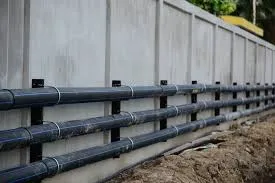Nov . 14, 2024 07:25 Back to list
pvc water supply pipe
The Role of PVC Water Supply Pipes in Modern Infrastructure
In the realm of modern construction and infrastructure development, the choice of materials is critical to the success and longevity of any project. One such material that has gained immense popularity in recent years is Polyvinyl Chloride (PVC) for water supply systems. PVC water supply pipes have revolutionized plumbing and water distribution, offering a myriad of benefits that are essential for sustainable infrastructure.
Durability and Longevity
One of the primary advantages of PVC pipes is their exceptional durability. Made from a robust plastic composite, PVC pipes resist corrosion and degradation caused by acidic soil and other environmental factors. Unlike traditional metal pipes, which can rust and deteriorate over time, PVC maintains its structural integrity for decades. This longevity not only reduces the frequency of replacements but also minimizes maintenance costs in the long run, making it a financially viable option for both residential and commercial constructions.
Lightweight and Easy to Install
The lightweight nature of PVC pipes is another significant factor contributing to their popularity. Compared to metal alternatives, PVC is much easier to handle and transport, which simplifies the installation process. Fewer labor resources are required, leading to lower overall installation costs. Additionally, the ease of cutting and joining PVC pipes allows for quick modifications and repairs, reducing project timelines significantly—a crucial aspect in today’s fast-paced construction environment.
Resistance to Chemicals
In plumbing systems, water may frequently come into contact with various chemicals, whether from soil, treatment processes, or industrial applications. PVC pipes exhibit a high level of resistance to a wide range of chemicals, making them an excellent choice for water supply systems. They do not leach harmful substances into the water, ensuring that the quality remains pristine. This characteristic is particularly valuable for potable water systems, where maintaining water purity is paramount.
pvc water supply pipe

Environmental Impact
PVC water supply pipes also have environmental advantages compared to their traditional counterparts. The production of PVC generates fewer greenhouse gases, contributing to a lower carbon footprint for construction projects. Moreover, PVC is 100% recyclable, which supports sustainable practices by reducing waste in landfills. As industries and municipalities increasingly seek to adopt greener practices, the role of recyclable materials like PVC becomes more prominent.
Cost-Effectiveness
The economic aspects of PVC water supply pipes cannot be overlooked. With lower material costs compared to metal pipes, alongside reduced labor expenses during installation due to their lightweight and user-friendly nature, PVC presents an attractive option for budget-conscious projects. Furthermore, the long lifespan of PVC means that initial investments pay off over time, further solidifying its cost-effectiveness.
Versatility and Applications
Another compelling reason for the widespread use of PVC pipes is their versatility. They are suitable for a variety of applications including residential plumbing, agricultural irrigation, drainage systems, and industrial water supply. The ability to customize PVC pipe sizes and fittings allows them to be adapted for diverse needs, making them a staple in various sectors.
Conclusion
In conclusion, PVC water supply pipes represent a significant advancement in plumbing technology. Their durability, lightweight nature, chemical resistance, environmental benefits, cost-effectiveness, and versatility make them an ideal choice for modern infrastructure projects. As cities and communities continue to grow and evolve, the reliance on efficient and sustainable materials like PVC will be essential in building a resilient future. Given these advantages, it is no wonder that PVC water supply pipes have become a preferred option for engineers and builders across the globe, ensuring safe and reliable water access for generations to come.
-
High-Quality PPR Pipes and Fittings Durable ERA PPR & PVC PPR Solutions
NewsJul.08,2025
-
Black HDPE Cutting Board - Durable, Non-Porous & Food Safe HDPE Plastic Cutting Board
NewsJul.08,2025
-
High-Quality CPVC Panel Durable HDPE & PVC Panels Supplier
NewsJul.08,2025
-
Double PE Welding Rod Supplier - High Strength, Durable & Versatile Welding Solutions
NewsJul.07,2025
-
High-Quality PVC-O Pipe Supplier Durable 75mm PVC Pipe & Connections Leading PVC Pipe Company
NewsJul.07,2025
-
HDPE Drainage Pipe Supplier – Durable & Corrosion-Resistant Solutions
NewsJul.06,2025

